annual report1-final.qxd - Overseas Indian
annual report1-final.qxd - Overseas Indian
annual report1-final.qxd - Overseas Indian
You also want an ePaper? Increase the reach of your titles
YUMPU automatically turns print PDFs into web optimized ePapers that Google loves.
Pravasi Bharatiya Divas<br />
Pravasi Bharatiya Divas<br />
Pravasi Bharatiya Divas<br />
Pravasi Bharatiya Divas<br />
based on knowledge. Like the Chinese, India<br />
would have to collaborate with the rest of the<br />
world for its future development, he said.<br />
Prof. Devesh Kapur demonstrated that human<br />
capital was an important indicator of development.<br />
Pointing out that the <strong>Indian</strong> diaspora had access to<br />
both global and local knowledge, he said it should<br />
help India to create resources to enter the growing<br />
demand for higher education. According to Kapur,<br />
the diasporic community could help in the following<br />
ways:<br />
(1) Play a strategic role in streamlining the primary<br />
education sector and persuade the <strong>Indian</strong><br />
States to provide free and decent primary education.<br />
(2) The young and the idealist should come to<br />
India to do voluntary work.<br />
(3) They could help in improving research<br />
activities.<br />
(4) They should help in setting up world-class<br />
universities.<br />
Dato Seri S. Samy Vellu argued that India and the<br />
diasporic community should collaborate in areas,<br />
which were strategically beneficial to both. He passionately<br />
pleaded for improving the infrastructural<br />
facilities in India, to which the Malayasian diaspora<br />
would contribute immensely. He said that in<br />
order to modernise India, one needed to modernise<br />
its roads first. It would create not only freeways but<br />
also help people from small towns to export.<br />
He also said that there is a need for a Diaspora<br />
News Network, not CNN, to connect people of<br />
<strong>Indian</strong> origin across the globe. He advocated<br />
strengthening of higher education, which would<br />
have a snowball effect on economic development.<br />
He requested that deliberations of the diaspora<br />
conferences should be documented and sent out to<br />
participants.<br />
Dr. Prem Misir said that the majority of the<br />
<strong>Indian</strong> diaspora were average working people. The<br />
diaspora had grown over a period of more than<br />
2,000 years and had a unique worldview. A distinction<br />
should be made between PIOs and the NRIs.<br />
He felt that the Government had a slant towards<br />
NRIs and that PIOs tend to be ignored. He cited<br />
from the history of Guyana and Fiji since 1870s and<br />
said that the nature of migration had influenced<br />
the identities of the diaspora. He suggested that<br />
ethnic identities should be recognised and any<br />
marginalisation should be prevented.<br />
He also suggested the following in the context of<br />
the Caribbean:<br />
(1) Co-existence of all cultures in the process of<br />
institution building.<br />
(2) Linkages with India must be sustained.<br />
(3) Enlightened <strong>Indian</strong>s must recognise the<br />
diversity of the <strong>Indian</strong> diaspora.<br />
(4) The diasporic <strong>Indian</strong>s should take interest<br />
in investment in India.<br />
Lalit Mansingh outlined a common agenda and<br />
basic principles since the diaspora was so diverse.<br />
He suggested that there were three broad types of<br />
diaspora:<br />
(1) Southern Diaspora<br />
(2) Western Diaspora<br />
(3) Communities Diaspora.<br />
He said that his experience of 41 years with diaspora<br />
engagements revealed that no matter where<br />
the diaspora was located, they have tried to achieve<br />
economic stability, maintain values and cultural<br />
centres and gradually participate in local politics.<br />
He pointed out that a common pattern of diaspora<br />
behaviour makes it easier for us to format a common<br />
agenda (a common minimum programme for<br />
overseas). Though, the first effort must be to define<br />
the items we do not wish to include in the agenda,<br />
he said. According to him, the following three<br />
guiding principles would be useful while defining<br />
a diaspora agenda. He said that<br />
(1) Nothing should be done to offend local<br />
sensibilities.<br />
(2) There should be no interference in the<br />
country’s internal affairs.<br />
(3) India’s policy of secularism should not be<br />
compromised.<br />
According to him, a common agenda must have<br />
the following principal objectives:<br />
! A common pursuit of universal values like<br />
democracy, human rights, anti-discrimination<br />
! Major areas of activities — political (there should<br />
be more political dialogue), economic (more economic<br />
engagement) and culture heritage (overseas <strong>Indian</strong>s<br />
7



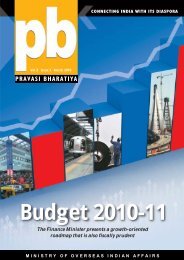
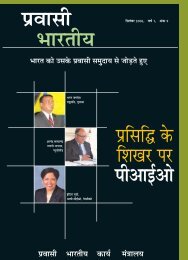

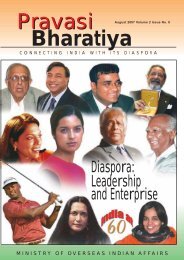

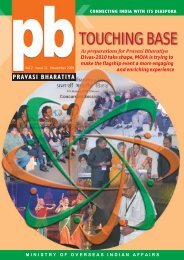
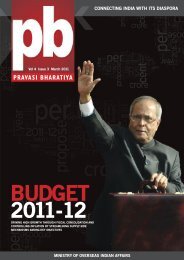
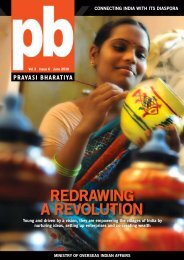
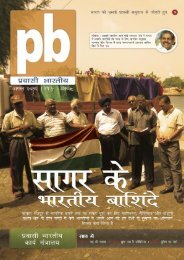

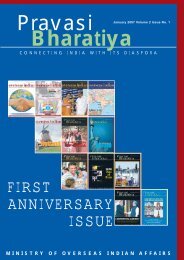
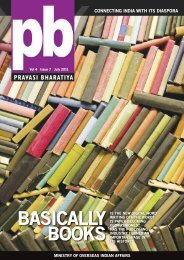
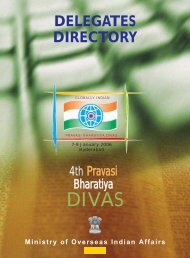
![flaxkiqj feuh izoklh Hkkjrh; fnol] vDVwcj 9&11 - Overseas Indian](https://img.yumpu.com/43977040/1/184x260/flaxkiqj-feuh-izoklh-hkkjrh-fnol-vdvwcj-911-overseas-indian.jpg?quality=85)
